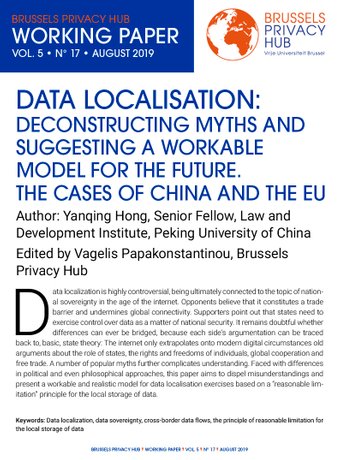Brussels Privacy Hub has moved to a new website as of 18 May 2022. The new website is available at www.brusselsprivacyhub.com. This version of the website will be stored for archiving purposes. Please see the new website for the latest updates.
WORKING
PAPERS
WORKING PAPER • VOL. 5 • N° 17 • August 2019
Data Localisation: Deconstructing myths and suggesting a workable model for the future. The cases of China and the EU
Author: Yanqing Hong, Senior Fellow, Law and Development Institute, Peking University of China
Edited by Vagelis Papakonstantinou, Brussels Privacy Hub
ABSTRACT
Data localization is highly controversial, being ultimately connected to the topic of national sovereignty in the age of the internet. Opponents believe that it constitutes a trade barrier and undermines global connectivity. Supporters point out that states need to exercise control over data as a matter of national security. It remains doubtful whether differences can ever be bridged, because each side’s argumentation can be traced back to, basic, state theory: The internet only extrapolates onto modern digital circumstances old arguments about the role of states, the rights and freedoms of individuals, global cooperation and free trade. A number of popular myths further complicates understanding. Faced with differences in political and even philosophical approaches, this paper aims to dispel misunderstandings and present a workable and realistic model for data localisation exercises based on a “reasonable limitation” principle for the local storage of data.
Keywords: Data localization, data sovereignty, cross-border data flows, the principle of reasonable limitation for the local storage of data
Connect with us
Brussels Privacy Hub
Law Science Technology & Society (LSTS)
Vrije Universiteit Brussel
Pleinlaan 2 • 1050 Brussels
Belgium
Stay informed
Keep up to date of our activities and developments. Sign up to our newsletter:
Copyright © Brussels Privacy Hub



